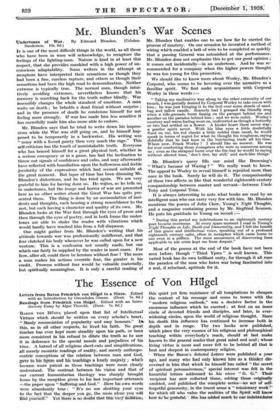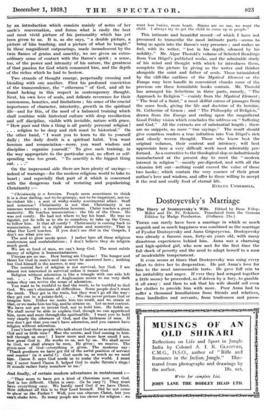The Essence of Von Hilgel Letters from Baron Friedrich von
Hiigel to a Niece. Edited
ductory Essay by Algar Thorold. (Dent. 7s. 6d.)
BARox von Hfsmr • placed upon that list of Intellectual Virtues which should be written on every scholar's heart, Manly renunciation of popularity and easy honours." Ia this, as in all other respects, he lived his faith.' No great teacher has ever kept more-steadily upon his path, or been More consistent in his refusal to dilute the truth as he saw it in deference to the special moods and prejudices of his time. A hatred of all religious short-cuts and simplifications, All merely monistic readings of reality, and merely anthropo- centric conceptions of the relation between man and God, gave to his figure and his teachings a lonely majesty ; which became more patent as those teachings were more clearly Understood. The contrast between his vision and that of our current humanitarian theology was sharply brought home by the reception giVen to his last important utterance 4--the paper upon " Suffering and God." - Here his own words were abundantly true : " It's no use shutting your eyei in the fact that the deeper you go, the more alone you will slid yourself." Yet there is no doubt that this' Very this quiet yet firm resistance of all temptations to cheapen the content of his message and conic to terms with the " modern religious outlook," was a decisive factor in the enormous influence which he exerted ; at- first on an inner circle of deVoted friends and disciples, and later, in ever- widening circles, upon the world of religious thotight. • Since his death this influence has continued to increase both in depth and in range. The two books - now ptibliiihed, Which place the very essence Of his religious and philosophical teaching within everybody's reach, should at last make known to the general-reader that great mind and Soul ; whose living virtue is more and more felt to be behind all that is best and deepest in contemporary religion.
' When the Baron's Selected -Letters were published a year ago, and many who had only known him as a thinker dis- covered in him that which he himself has called " the secret of spiritual persuasiveness," special interest was felt in the -beautiful letters addressed to his niece " G. G." • Their recipient has now collected these, adding those • originally omitted, and published the complete seriesan act of self- forgetful generosity, in- the truest sense a " Missionary Work" for which all who value the realities of the Spirit will. know he* to-he-grateful. She has added much to our indebtedness by an introduction which consists mainly of notes of her uncle's conversation, and forms what is easily the best and most vivid picture of his . personality which has yet been given to us. It is, as she says, " a double picture, a pietuire of hiin teaching, and a picture' Of what he taught." In these magnificent outpourings, made incandescent by the twin flames of genius. and sanctity, we are given an extra- ordinary sense of contact with the Baron's spirit ; a sense, too; of the power and intensity Of his nature, the greatness or that _passion for 'God which 'consuined "hhil,' and the depth
of the riches vilieh he had to bestoW.
Two strands of thought emerge, perpetually crossing and blending with one another. First his profound conviction of the transcendence, the " otherness " Of God, and all he found lacking In this -reSpect in Contemporary thought. Next, his own love of souls, and delicate reverence for their variousness, beauties, and limitations ; his sense of the crucial importance, of character, interiority, growth in the spiritual life—and for this, of the need of a balanced training which shall combine wide historical culture with deep recollection and self discipline, Visible with invisible, nature with grace. "1-loW poor and thin a thing is all purely personal religion
. religion to be deep and rich must be historical." On the other hand, '" I want you to learn to die to yourself
daily ; the daily death is a spiritual habit: You want •
heroism and reminciation—more, you want wisdom . and discipline : organize yourself." To give such training, in the way appropriate tb the particular soul, no effort or self- spending was too great. " To sanctify is the biggest thing out. . .
On the impersonal side there are here plenty of sayings— indeed of warnings—for the modern religious world to take to heart ; and especially that- part- of it which is concerned with the dangerous task of restating and popularizing
Christianity :--
"Christianity is a heroism. People seem sometimes to think it is a dear darling, not-to-be-grumpy, not-to-be-impatient, not-to- be-violent life ; a sort of wishy-washy sentimental affair. Stuff and nonsenee ! Christianity is not that. Christianity is an immense warning ; a tremendous heroism. Christ teaches a great austerity. He teaches renunciation : the life of the Cross. He was not comfy. He had not where to lay his head. He was no rigorist, yet he tells us to die to ourselves, to take up the Cross, to follow him. Is that all comfy 7 Christianity is coining back to renunciation, and to a. right asceticism and austerity. That is what Our Lord teaches. If you don't see that in the Gospels, I don't see what yOu see.
The soul to grow needs quiet. I rather hate all these religious conferences and confabulation's ; I don't believe they do relief% much good.
. We are so fond of men, we can't keep God. The most subtle enemy of religion is humanitarianism.
`Utopias are no use. How "boring are Utopias ! The hunger and thirst for God in man's soul can never be answered here ; nothing but God himself is the answer, is any use. The central fact of religion is not survival, but God. I am almost not interested in survival unless it means God.
Religion without adoration is like a triangle with one side left out. . . . The future of Anglicanism seems to me very dark unless they can revive the sense of adoration.
You want to be truthful to find' the truth, to be truthful to find God. We can't eliminate all difficulties. Some people don't want the truth. They &tin the train, but they won't go all the way : they .get out in a potato-field. . . . We can never picture God or iinagine him. Either we make hiin too small, and we strain at that, or we make him t,00tig, and he strains us. Let us rest content. We. have not got to invent God, nor to hold. him.• He holds us. We shall never be. able to explaip God, though we can apprehend him, more and more threughthe spiritual life. I want you to hold 'fiery clearly the otherness of Cared, and the littleness 'of men. If you don't get- that you can't have adoration, and you cannot have religion without adoration. I can't bear those people who, talk about God and us as mutualities. enid and- us little Men Man the centre; and God coming to hini- half -through us men! I know more and more how small I am, how great . God is. He works in .us, not by- us... We shall never be God, we .811411 always he men. „ He gives : we receive. The given-ness of God—everything is given. The moderns say ` Thank goodness we halt° got rid Of the awful position of Servant and- master' (is it awful 7).. -God needs us, as much as we need biro.. gallon S. says God needs us to make the world. I must say I never heard Canon S. helped God to make Saturn's rings 1 It sounds rather fuSty soniebciiv to Me."'
And, finally, of certain modern adventures in restatement
They seem to have -got- a kind of Christism now, not God. God is too. difficult, Christ is . easy- as he easy 7). have must everything easy. We 'hardly need God if we have Christ. Hci"w different" all this is' to" Chit 'Lord himself. he not camp to -ahoy/ • us the Father • Well; -you--can obscure ,Cbrist, -but you easet.shake him. So many Rea* are too clever _for _religion L. we
want less brains, more heart. Brains are no use, we want the child. I always try to get the child to come up in people."
This intimate and beautiful record—of which I have not presumed to transcribe the most intimate parts—seems to bring us again into the Baron's very presence ; and makes us feel, with its writer, " lost in his depth, silenced by his nobility." Mr. Algar Thorold's volume of Selected Readings from Von Hilgel's published works, and the admirable study of his mind and -thought with which he introduces them, complete the picture by giving us the writer and thinker alongside the saint and father of souls. Those intimidated by the cliff-like outlines of the Mystical Element or the Essays may here handle in convenient chunks some of the precious ore these formidable books contain. Mr. Thorold has arranged his Selections in three parts, namely, " The Approach to Religion "—mainly from the Mystical Element ; " The Soul of a Saint," a most skilful catena of passages froni,' the same book, giving the life and doctrine of its heroine; St. Catherine of Genoa ; and " The Philosophy of Religion," drawn from the Essays and ending upon the magnificent Good Friday vision which concludes the address on " Suffering and God." All the extracts are of substantial length ; there are no snippets, no mere " fine sayings." The result should give countless readers a true initiation into Von Hiigel's rich and closely woven thought. Those who know best the original volumes, their content and intricacy, will best appreciate here a very difficult work most admirably per- formed. As a corrective to the theological slop so industriously manufactured at the present day to meet the " modern interest in religion "—mostly pre-digested, and with all the vitamins left out—nothing could exceed the value of these two books ; which contain the very essence of their great author's love and wisdom, and offer to those willing to accept it the real and costly food of eternal life.
EVELYN UNDERHILL.









































 Previous page
Previous page